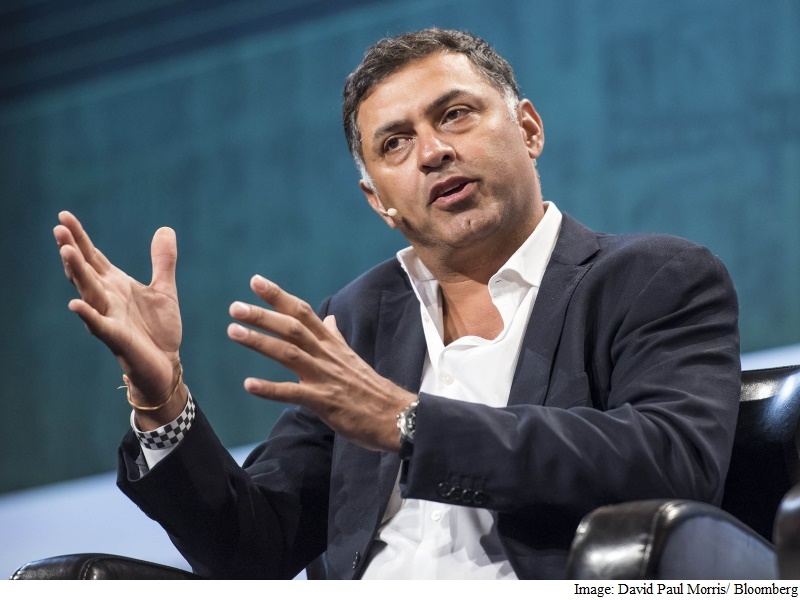- Home
- Telecom
- Telecom Features
- Nikesh Arora's Walkout Returns the Focus to Japan Inc. Succession Woes
Nikesh Arora's Walkout Returns the Focus to Japan Inc. Succession Woes

SoftBank founder Masayoshi Son, 58, said Tuesday he wants to remain at the helm of the company he built from a computer software distributor into one of Japan's largest telecommunications and investment groups, while Arora aspired to be chief executive officer more quickly.
Son's decision to cling to control until he loses confidence in his physical strength is the latest example of a leadership transfer at a Japanese company that's gone wrong. Many of these firms are managed and owned by aging entrepreneurs, such as the 67-year-old billionaire Tadashi Yanai's Fast Retailing Co., and often the transition is far from smooth.
"Succession planning is going to be the biggest issue for Japanese companies run by their founders in the next five to 10 years," Dairo Murata, an analyst at JPMorgan Securities Japan Co. in Tokyo, said by phone. "It comes to the surface as a risk for investors if there's still no clear picture of succession when they get old."
In SoftBank's case, the founder simply changed his mind. Son recruited Arora from Google in 2014, and installed him to president last June, saying he's the most likely candidate to take over the business. Although it had never been made public to shareholders or employees, Arora and Son had discussed the CEO giving up his post at 60, a birthday coming in August next year.
"The older those business managers become, the harder it gets for them to pass the baton to the next generation," Mitsushige Akino, a Tokyo-based executive officer at Ichiyoshi Asset Management Co., said by phone. "They struggle to find someone who they think is more capable than themselves. From the heir's point of view, it's also difficult to step into the shoes of charismatic leaders."
A family feud at a high-end furniture retailer, a household name in Japan, became the most high-profile case of how company succession can go wrong. Katsuhisa Otsuka, the then 71-year-old founder of Otsuka Kagu, tried to fire his daughter five years after naming her president. In a February 2015 news conference, he called her a "bad child," launching a proxy fight to remove her that ultimately ended in failure.
A similar spat erupted this year at Seven & i Holdings Co., this time involving billionaire activist investor Dan Loeb. The hedge fund head intervened in March to stop a plan by Toshifumi Suzuki, the then 83-year-old chairman and CEO of the retail giant, to remove a possible candidate to take the reins.
Loeb raised concerns about Suzuki's "chronic health problems" and claimed the CEO planned to anoint his son as successor. At a board meeting in April, Suzuki failed to get his way. Ryuichi Isaka, the executive Suzuki had tried to remove, became the new president, while Suzuki resigned.
Sometimes, it takes a scandal to get older leaders to relinquish the top role. Suzuki Motor Corp.'s admission that it used unapproved fuel-economy testing methods forced the 86-year-old chairman Osamu Suzuki, a member of the founding family, to step down from the post of chief executive officer as of the company's June 29 annual shareholder meeting, paving the way for a new management structure.
Succession has also occupied the thoughts of Japan's richest person, Fast Retailing's Yanai, who turned the casual-clothing maker and retailer he inherited from his father into a global name and owns more than a fifth of the company. At 67, he serves as chairman, president and CEO.
Yanai ceded the president's role to Genichi Tamatsuka, the current chairman and CEO of Lawson Inc., in 2002 but returned to the position after only three years. While once saying that he would retire at 65, Yanai has stayed at the helm and said he wants to choose his replacement from the company's executive officers.
JPMorgan's Murata described Yanai as Fast Retailing's "everything" and noted that it would be tough for one person to take over all the responsibilities he has, saying Yanai is likely to seek to install a multi-person leadership team. The timing is unclear but it shouldn't be "too late," Murata said.
Pei-Chi Tung, a spokeswoman for Fast Retailing, said she had no further comment on the company's succession.
Global private equity firms have been trying for years in Japan to position themselves as the answer to the country's succession problem. Some, like Carlyle Group, have had success, while others gave up and withdrew from the country.
Nihon M&A Center Inc. has taken a different approach to profiting from the dilemma. The company serves as a matchmaker for aging CEOs, especially for smaller firms in Japan's countryside. It's become a darling of investors, with shares surging more than sixfold since 2013.
For Yanai, however, who also serves on SoftBank's board, there isn't too much wrong if a company's key person stays on for longer.
"There's nobody like Mr. Son," Yanai said at SoftBank's shareholder meeting Wednesday. "I said to him, 'You were talking about retirement before you even turned 60? You must be kidding me.'"
© 2016 Bloomberg L.P.
Get your daily dose of tech news, reviews, and insights, in under 80 characters on Gadgets 360 Turbo. Connect with fellow tech lovers on our Forum. Follow us on X, Facebook, WhatsApp, Threads and Google News for instant updates. Catch all the action on our YouTube channel.
Related Stories
- Samsung Galaxy Unpacked 2026
- iPhone 17 Pro Max
- ChatGPT
- iOS 26
- Laptop Under 50000
- Smartwatch Under 10000
- Apple Vision Pro
- Oneplus 12
- OnePlus Nord CE 3 Lite 5G
- iPhone 13
- Xiaomi 14 Pro
- Oppo Find N3
- Tecno Spark Go (2023)
- Realme V30
- Best Phones Under 25000
- Samsung Galaxy S24 Series
- Cryptocurrency
- iQoo 12
- Samsung Galaxy S24 Ultra
- Giottus
- Samsung Galaxy Z Flip 5
- Apple 'Scary Fast'
- Housefull 5
- GoPro Hero 12 Black Review
- Invincible Season 2
- JioGlass
- HD Ready TV
- Latest Mobile Phones
- Compare Phones
- Leica Leitzphone
- Samsung Galaxy S26+
- Samsung Galaxy S26 Ultra
- Samsung Galaxy S26
- iQOO 15R
- Realme P4 Lite
- Vivo V70
- Vivo V70 Elite
- Asus TUF Gaming A14 (2026)
- Asus ProArt GoPro Edition
- Huawei MatePad Mini
- Infinix Xpad 30E
- Huawei Watch GT Runner 2
- Amazfit Active 3 Premium
- Xiaomi QLED TV X Pro 75
- Haier H5E Series
- Asus ROG Ally
- Nintendo Switch Lite
- Haier 1.6 Ton 5 Star Inverter Split AC (HSU19G-MZAID5BN-INV)
- Haier 1.6 Ton 5 Star Inverter Split AC (HSU19G-MZAIM5BN-INV)














